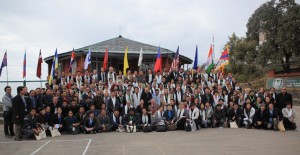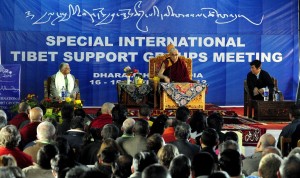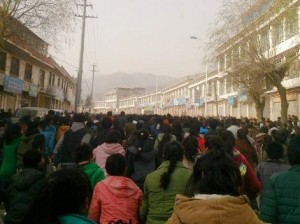Various Tibet support groups, politicians, and journalists, including 20 Chinese delegates, gathered on the morning of November 16th for the opening of the Special International Meeting of Tibet Support Groups. The meeting, which took place within Dekyi Tsering Hall, Upper TCV, in Dharamsala, was organized by Core Group for Tibetan Cause – India and facilitated by Department of Information & International Relations (DIIR) of the Central Tibetan Administration.
As announced in the press release distributed by the DIIR last week, this meeting, with more than 200 members of groups from 43 countries around the world, was aimed at identifying and developing a means to efficiently address the worsening situation in Tibet and the rising number of self-immolations.
Indeed, the number of self-immolations is rapidly increasing, and this urgent meeting explored ways to strengthen support from the international community and to pressure the Chinese government to stop all repressive policies inside the country that are provoking Tibetans to protest. Specifically, the meeting wishes to urge the United Nations to engage in and confront issues pertaining to the crisis in Tibet.
At the opening session, a minute of silence was observed in memory of those who have sacrificed their lives. The director of Core Group for Tibetan Cause – India, Dr. NK Trikha, then opened the work session, calling the situation “urgent and critical” and declaring that there is “the imperative need for support groups to meet to coordinate their efforts in support of Tibet.”
Sikyong Dr Lobsang Sangay then thanked all the people who came from around the world to participate in this meeting. “By bringing together all Tibet support groups,” he said, “it is a strong message that we want to address, in Beijing, the message that we are more united, stronger and stronger, and that the issue of Tibet remains intact and alive. Together, we can work and make the Tibetan cause a major diplomatic issue of the year 2013.” He concluded by saying, “this meeting can and should give hope to the Tibetans in Tibet, showing them that their voices are heard.”
On Saturday, representatives of the various support groups were able to meet His Holiness the 14thDalai Lama for a private audience.
Work sessions during the three-day meeting led to a plan of action with various proposals, including the establishment of an intergovernmental forum to develop an action plan in response to the self-immolation before the end of 2013. The tactic would be to organize days of lobbying and advocacy in international forums, supported by a communication campaign on the self-immolations. Moreover, this forum would work with a wider range of outlets by organizing rallies and other events, and appeal to local media and the general public using a strategy based on social networking.
Furthermore, the plan calls for developing Lhakar, a homegrown Tibetan self-reliance movement, in 25 additional countries over the end of the year 2013, and strengthen the movement where it already exists. The plan would encourage support groups, associations, and Tibetan Buddhist centers to join the Lhakar movement by setting up presentations, workshops targeting key organizations, and by seeking support from celebrities, parliamentarians, and others. The recommended actions include sustained use of social networks, online videos, flash mobs, and cultural events.
On the international stage, the plan aims to stop the re-election of China to the United Nations Human Rights Council before November 2013. Targeting UN member states, this movement will create support from civil society and attempt to utilize delegates’ ‘no vote’. Despite the likely reelection of China, the effort would be considered a success if it manages, through days of lobbying, letter writing, and online actions, to create awareness among the general public and generate media coverage of the appalling record of human rights abuses in China. Furthermore, the plan suggests creating a network of the eight governments whose countries are dependent on water from Tibet. this campaign will target the environmental ministries of India, Pakistan, Burma, Bangladesh, Laos, Cambodia, Vietnam, and Thailand.
The concluding statement of the meeting read, “We express deep anguish that Tibetans feel compelled to self-immolate as an act of political resistance. We resolutely stand in solidarity with their aspirations for freedom and for the return of His Holiness the Dalai Lama to his homeland. Responsibility for this crisis lies with China’s leaders and their failed Tibet policies over the last sixty years. We call on China’s new leaders to urgently address the root causes of these self-immolations. ”
“We, the conference participants,” it continued, “renew our commitment to work together and in cooperation with Tibetan organizations, Chinese human rights defenders, and other concerned organizations around the world, in pursuit of a political solution to the Tibet issue consistent with international human rights standards.”
Tsering Dhondup, Secretary of the Office of Tibet in France, noted that, “it is always a great experience to work with people from all over the world with different cultures and paths, and see what they do in their country for Tibet. And as Sikyong Lobsang Sangay said, the year 2013 will put the Tibet issue on the table of every government.”
A Brazilian participant stated, “we came all the way from Brazil to support Tibetans; it is about humanity. So we are here to discuss human rights and non-violent actions.”
Hope is on everyone’s lips. Whether in the short or long term, the conference participants anticipate their work will benefit the fight for an improvement of the situation in Tibet.






 Print
Print Email
Email